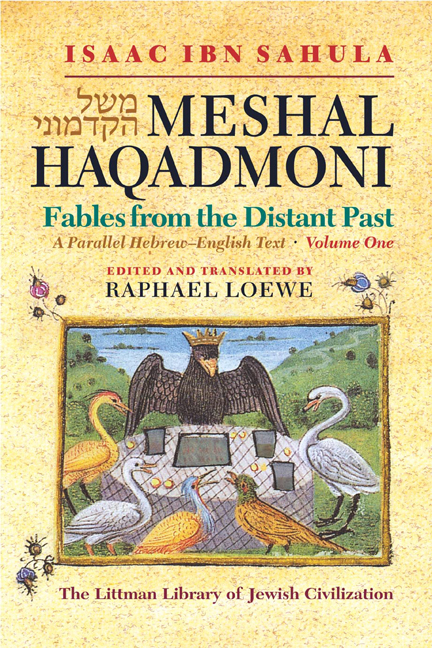Book contents
- Frontmatter
- Epigraph
- Publisher’s Note
- The Illustrations
- Preface
- Contents
- List of Abbreviations
- Introduction
- MESHAL HAQADMONI
- Part I On Wisdom
- Part II On Penitence
- Part III On Sound Counsel
- Part IV On Humility
- Part V On Reverence
- Appendices
- Bibliography
- Index of Citations
- Index of Key Hebrew Terms
- Index of Subjects
The Fourth Part
- Frontmatter
- Epigraph
- Publisher’s Note
- The Illustrations
- Preface
- Contents
- List of Abbreviations
- Introduction
- MESHAL HAQADMONI
- Part I On Wisdom
- Part II On Penitence
- Part III On Sound Counsel
- Part IV On Humility
- Part V On Reverence
- Appendices
- Bibliography
- Index of Citations
- Index of Key Hebrew Terms
- Index of Subjects
Summary
Humility's praise, proved by arguments
A fortiori and twinned texts’ contents
‘WHO’, ASKED THE CYNIC,
‘speaks, and at his worda
Dirges and mourning cries are forthwith heard?
Prolix beyond proportionb to adduce
Arguments from afar,c commending use
Of humble manners, till his soul, that yearns
To be called meek, lies crushed,d what time he spurnse
Violent evil, blithely unawaref
Of secrets rumour bruits about the air:
To wit, that whosoever flaunts his pride
Toils not, nay, he unwearied shall abide.
Whereas the meek, like Cain must ever stray,g
His lowness humbled more beneath the sway
Of arrogance, cast down beneath the tramp
Of men who, violent, on reason stamp,
Their hopes all set upon life's goodly spread
Whilst on more modest backs roughshod they tread.
So let each mother's son look, and mark well,h
How Israel's first king, Saul, from favour fell,
Who had his misplaced modesty to thank
For loss of throne, authority, and rank:
Thereon the prophet, left to lead his folk
To war and back from battle, sternly spoke,
“Slight though thou mayest be in thine own eyes,j
Thou art the king, but didst not exercise
Firm rule: forfeit thy rank, each single thing
Thou ownest; God rejects thee now as king,k
Since broken, crushed,l henceforth thou art no more
Than a mere vagabond.” Whoso, therefore,
A humble mien in self-abasement wears,
’Tis arrant follym on his part: he shares
The cony's destitution, left by fate
To starve.n His history I now relate.
Men say that once there lived in Sheba's land
A buzzard—stout his thighs,o his plumage, fanned,
A splendid sight,p which he showed off with pride:
Fast could he run, and, like the eagle, glide
From far,q afoot he sped by tortuous ways
Rabbits to catch, bewildered by his maze—
Vengeful, and warningr of what lay before;
From distant parts he sniffed the scent of war.s
Amongst the rabbits one there was, it chanced,
Of perfect parts, meek-mannered, well advanced
In years.t
- Type
- Chapter
- Information
- Meshal Haqadmoni: Fables from the Distant PastA Parallel Hebrew-English Text, pp. 420 - 552Publisher: Liverpool University PressPrint publication year: 2004

